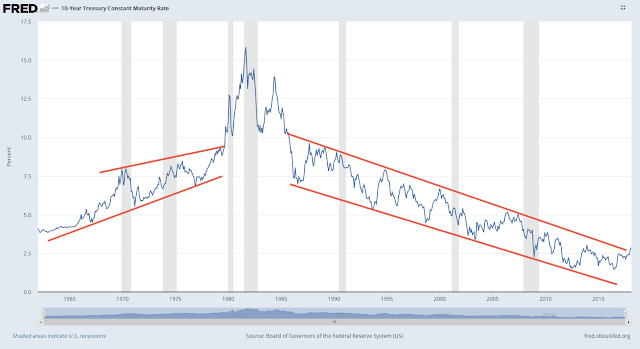Interesting Readings 21 Feb 2018
Here are some interesting readings/listen today:
Adventures in Finance by Real Vision Episode 53 - Unfixed Income: The Bond Market Meltdown: Grant Williams and team talks to Jeffrey Snider of Alhambra Partners & Greg Weldon of “Weldon Live” about the Bond Market. The episode was recorded on Feb 8 but nevertheless it is a must listen.
Jeff believes current correction is similar to Oct 2014.
Jeff believes we are trending lower on the neutral interest rate and analyst believe the cap around 3%. There is merit in the argument. Look at the chart of 10-yr rates (annotations are mine). He states this looks like "Japanification".
Greg takes a different view - he implies that this trend is unhealthy and may reverse for a long time.
Greg compares this time frame to 1987.

Cash, Cat and Mouse by JP Koning discusses the cat and mouse game between tax authorities and taxpayers in the domain of retail payments.
There are two weak points in the sales process that allow cash-accepting retailers to avoid paying sales taxes or VAT. The first weak point is at the very outset of a payment. When a customer pays with cash, the person behind the till can avoid ringing up the payment. Without a record of the payment having been made, the retailer needn't pay tax.
But even if a retailer rings up all cash payments and provides receipts, they can still avoid paying taxes. At the end of the business day, they need only doctor the cash register's data using a zapper—add on hardware or software designed for this purpose—in effect purging all or a portion of the cash payments registered during the course of business. With the only record of that day's cash payments now being the paper receipts held in customers' wallets—most of which will have been thrown away—the retailer needn't worry about the tax authority discovering the doctoring. (Erasing card based payments is much riskier for the retailer because a paper trail still exists with the card-issuer.)...
One neat trick to get retailers to provide receipts—and therefore run all transactions through the tamper-proof cash register—is to recruit the customer into the cat and mouse game as helper. Public information campaigns exhorting people to ask for receipts are one technique. But the more interesting trick is implementing a tax-receipt lottery. All invoices issued from the tamper-proof cash register come with a unique lottery number. Anyone who keeps their invoices will be able to participate in a periodic lottery. Customers thus have an incentive to ask the retailer for a receipt, obliging the retailer to run the transaction through the fiscal till.
This is another aspect of going cashless. Can payments app help in this? I think so.
India Bank Fraud
Banks vulnerable to hackers without online interface between CBS, SWIFT says Leslie D'Monte in Mint. While the premise is not wrong, it is not the complete picture. There are multiple control systems in any organisation. IT system is one, management control is other. Management control includes operational control and audit systems. All these systems work together. The article airs another misgiving about cybersecurity. Cybersecurity does not imply one technology -but it is a set of processes. Each part by itself does not always grant complete security but the process, taken together, should make it secure. PNB, I suspect, did not fail at that. I suspect there is involvement of few more people at PNB and also few from regulatory agencies. So I was happy when I saw this:
CBI widens PNB fraud probe to include bank’s top brass. I hope they also look into the RBI and Finance Ministry. Alternatively, Subramanium Swamy may already be on that one.
World war Watch
Turkey will attack Syria's Afrin 'in the coming days', Erdogan says. The situation in the middle east is turning bad quite quickly. Just a few months ago ISIS was cramped and it seemed that the situation may stabilise soon. Yet, this new intervention will fuel further problems. The problems of middle east arise from the random drawing of borders by the British and the Americans after the Second World War. But they have been aggravated by what I believe is Kissinger policy. Thus, the rulers and their armies (who want control), the population (who want peace and prosperity) and challengers (who are being oppressed by the rulers) have completely divergent interest resulting in continuous festering.
The Maldives, since its independence in 1965, has had an “India first” policy and leaders of both countries have held high-level exchanges on regional issues. But since Yameen took office, he has aligned with China, which has defended his authoritarian rule. The Maldives now owes about 80% of its foreign debt to China, which has been spreading its wings rapidly in South Asia and has been eyeing the atoll nation for its strategic location. China has already cosied up to Nepal by helping the latter reduce its significant trade deficit; it has invested heavily in Sri Lanka and Pakistan. China is strategically encircling India under the fancy name of the “Silk Road Project”. A part of the road will also pass through Pakistan-occupied Kashmir and may eventually help further Pakistani ambitions in Kashmir.
Buy my books "Subverting Capitalism & Democracy" and "Understanding Firms".


